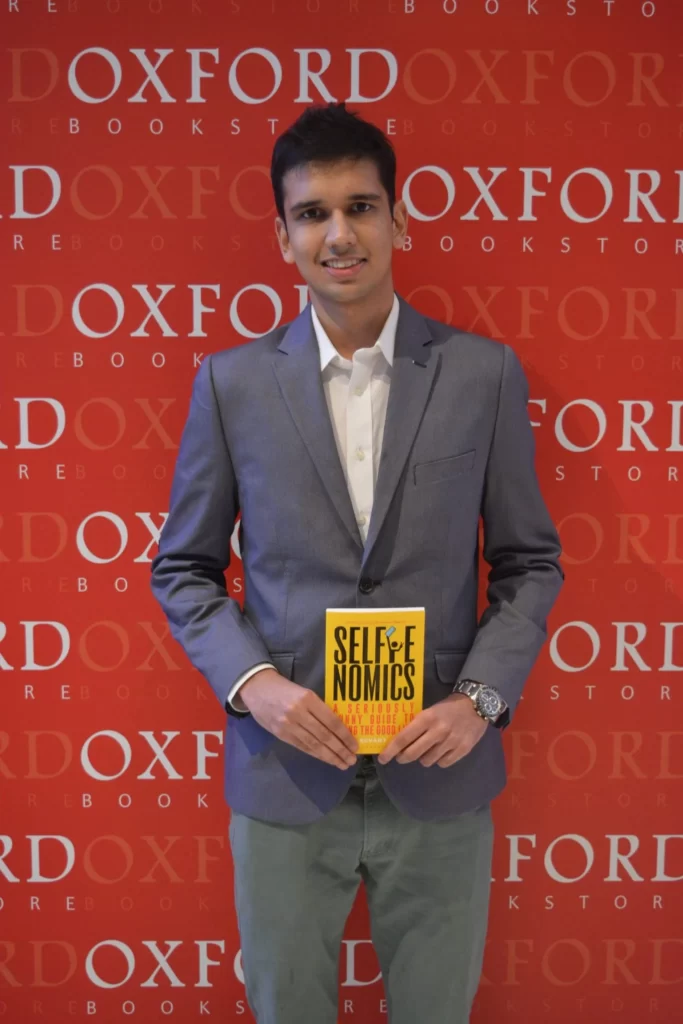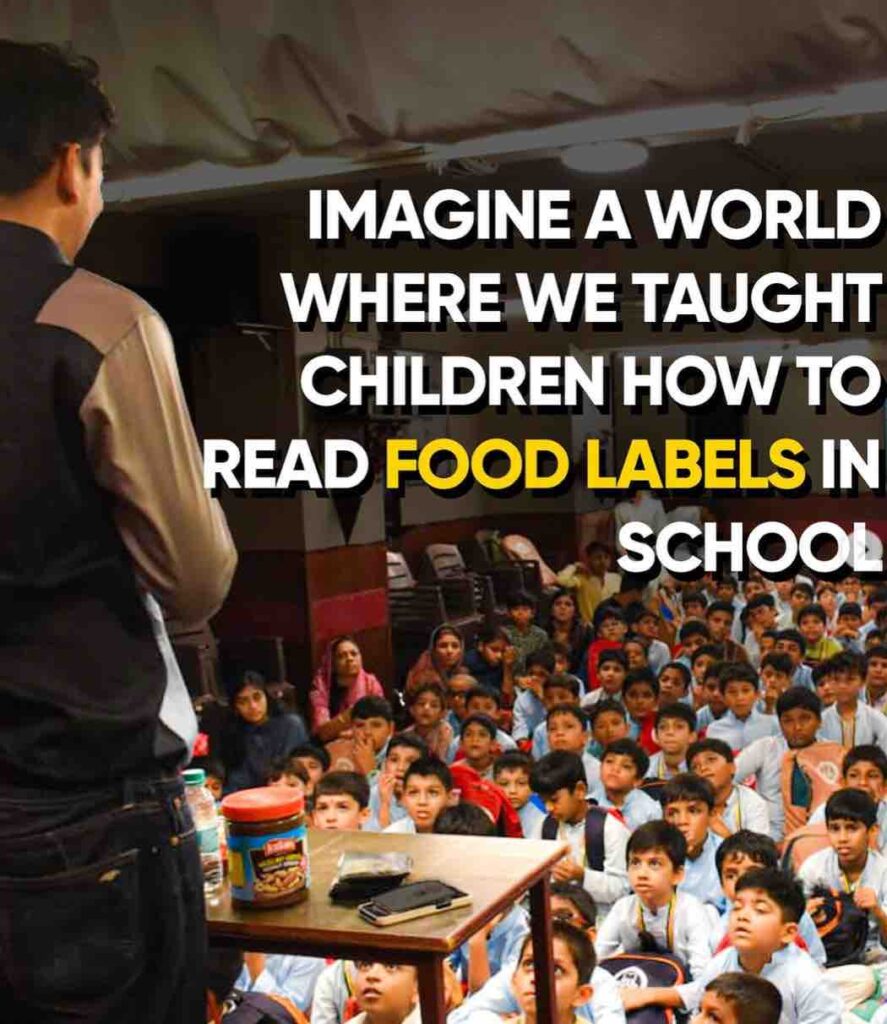Packaged food—a technique that was invented to preserve food long-term for people in need during years of war—is still going strong decades later. Although things are much different now, perhaps for all the wrong reasons. Over the last several decades, this necessity of wartime has transformed into a flourishing consumer brand industry laden with synthetic flavoring, coloring, and even carcinogenic chemicals. Despite the rising health awareness in our country, the issue is not simply with these junk foods but with the seemingly ‘healthy’ brands that tend to mislead about their products, choosing to focus only on the health benefits of a few ingredients in the recipe. In this scenario of rampant misinformation, Revant Himatsingka is working to help the Indian audience be healthy and aware.

Contrary to popular belief, he is not completely against packaged food because he realizes the importance of its accessibility. Himatsingka, popularly identified through his social media handle ‘Foodpharmer’, simply wants to work against misinformation. FMCG giants have become strategic with their marketing to mask the unhealthy aspects of their products, and he wants full transparency. Working towards making Indians healthy, his is a journey that has just started but has already seen a fair share of highs and low.
Where did it all begin? From finance to a published author
While born and raised in Kolkata, Himatsingka spent most of his early adult life in the USA and UK. After completing his undergraduate degree in finance from New York University’s NYU Stern School of Business, he started working as a consultant at one of the top firms in the US.
While working there, he realised that an average person spends a lot of time assessing small issues that concern us, like the reviews or ratings of a movie we want to see or the food we wish to order. This analytical lens falls short when dealing with big issues. Self-reflection for our entire life structure is necessary; people tend to only follow whatever beliefs their parents have, without question. This can range from religion to the choice to be a vegetarian or non-vegetarian.

This reflection was the foundation of Himatsingka’s book ‘Selfienomics’, an initiative he took on after studying nutrition for a year. The book, in a humorous cadence, dealt with important topics like health, religion, finance, and much more.
“For the bigger things, we blindly follow our parents; for smaller things, like movies and ordering food, we look into so many details. This bothered me—the big things we don’t focus on—that’s why I wrote Selfienomics. In fact, the topics that I talk about today, were the things I wrote a lot about in the book as well,” relayed Himatsingka in an interview with The Story Watch.
A seed to help the people is planted
Not all was smooth sailing when Himatsingka thought of publishing his book. At first written for a global audience, he was told by the publishers in the USA that not many were willing to read a book published by an Indian author unless it raves about stereotypical topics like yoga or spirituality. The aspiring author had to restructure his book to fit the Indian market. Handwork paid off, and Selfienomics was published under the prestigious Bloomsbury publications.
Unfortunately for Himatsingka, his book dropped on the same day demonetization was announced. While the sales were a little rickety at the start, they received a very positive response in terms of ratings and reviews. This traction assured Himatsingka that he wanted to take a route that helped people.
The decision that best described his ambition was when he came back to India to promote his book. While in India, Himatsingka was accepeted into the prestigious IIM Bangalore, but he decided not to go because his focus on the book took precedence. Eventually, he moved back to the USA to get his MBA from The Wharton School. During his time working as a consultant at McKinsey, Himatsingaka became privy to an unhealthy pattern among people.
Revant Himatsingka observed a concerning trend: health-conscious individuals consuming seemingly healthy drinks, unaware of their hidden harmful effects. Of all the social issues, perhaps health was the field that was both easy to tackle and was a truly global issue. Out of thousands of years of human history, packaged food has gained the most traction in the last 50–70 years. Increasingly, brands have started blatantly misleading their customers, and most people fall for it. Himatsingka knew this was an issue he wanted to tackle.
Early days of the FoodPharmer journey
“I realised, as a consultant, you’re supposed to think about the business problem in a structured way. When it comes to life’s problems, if you think in a structured way, health, is the top priority for most adults. If you solve the issue of misinformation in the packaged food industry, you’re solving one of the biggest issues in life. This is a much easier social issue to solve than complex issues like poverty or pollution,” shared Himatsingka.
Himatsingaka had already been helping people in his circle to understand the nuances of food labels, and soon this effort became bigger. He started his social media account to spread awareness and educate people about the things they were consuming. Foodpharmer, a combination of farmer and pharmacy, dives into the details to make every packaged food consumption a choice instilled with awareness.

An endeavour like this requires the deconstruction of preconceived notions. People aren’t always willing to hear criticism about the things they have consumed for years. But the best thing about Himatsingka is that trust and credibility come easily for him. This is primarily because whatever he teaches people is already mentioned on the packaging; he just brings awareness and clarity to it. Famously known as a ‘de-influencer’, he doesn’t earn a single penny from his social media activity, which garners more trust from his followers. He has also featured a lot of the leading health specialists in India to create an open and informative discussion about these issues.
Lying by omission: Himatsingka’s look into strategic marketing
Revant Himatsingka knew that teaching Indians to be aware of ingredients was necessary, even though packaged food is not as rampant in India as in the USA. The distinction and the cause are very obvious to Himatsingka. While packaged and frozen food consumption is higher in the US, the audience is still more aware. In contrast, in India, limited ingredient scrutiny allows brands to evade accountability.
Himatsingka acknowledges a significant issue: affordable brands like Parle G or Britannica cannot be exceptionally healthy. And India is a very price sensitive market, you cannot really create a mass market product at a low price point that would fall in the category of being healthy. But major problems arise when brands market their products as ‘healthy’ when they are not. He notes that even new-age companies promoting items like peanut butter as ‘healthy,’ are only deemed ‘less unhealthy’ by his standards.

“I have said this many, many times in interviews. I don’t have a problem with junk food but a problem with junk food marketing itself as healthy, Peanut butter is marketed as high-protein when it is in fact high-calorie and medium-protein. New-age brands are doing the same as legacy brands,” said Himatsingka.
Himatsingka’s endeavours to make people aware are embodied in the positive responses he gets back from his viewers. Learning how to read labels correctly and being more mindful of what one consumes can be revolutionary. Not just with people; there have been positive changes in companies too. His video on Maggi’s Rich Tomato Ketchup about how the ingredients had more sugar than tomatoes urged Nestle to change the recipe to include more tomatoes, which will ultimately create an impact on a large scale.
Not a steady road: challenges along the way
Revant Himatsingka manages the production of every video alone, with only one video editor to support his efforts. The road has not been seamless, even more so when there is pressure from the family to opt for more conventional approaches to life. But all efforts aren’t in vain, and with his increasing social media reach, currently at 1 million followers, his family’s has been more understanding but still sprinkled with worry when the lawsuits start coming in.
Battling against the misinformation spread by big corporations has been taxing, but Himatsingka isn’t ready to back down. Many companies have come after his video’s with legal notices and court orders, one even spiralling into a 2 crore defamation suit. Yet objectively, Himatsingka doesn’t believe his act of reviewing products is remotely illegal. One knows how many critics and reviewers review a piece of media or product every day. Himatsingka isn’t ready to back down from his work, though he has taken up more careful language in reviewing the products.
A major goal of his, is to form a social entrepreneurial venture through this medium, not just for himself but also because he wants his work to encourage people to do the do good for the society and earn money. He knows this line of work can be daunting, and he wants to create a positive outlook for it.
“Way back in the day, I used to do whatever I wanted, then I got slightly cautious, and now again, I do whatever I want. In the middle, I was in contact with some lawyers. The problem with lawyers is that they try to protect you from worst-case scenarios, which they rightfully should. But the problem is that they never look at the best-case scenario, which is the lives of millions and millions of people being changed,” shared Himatsingaka about the legal battles.
Towards a hopeful future
Despite legal struggles, Himatsingaka is not deterred. He knows that no matter how careful he gets, a company will come after him if they want to. Hence, his focus is solely on educating and helping as many people as he can about nutrition and health. His loyal following of people who support him keeps growing stronger. With enough time, he hopes to reach more and more people in India through his efforts.
“If a crappy movie comes out and there are 50 million views on just the trailer in a few days, when I make an informative video to help India’s health, why are only 1-2 million people watching? Even 1-2 million is a lot, but this is surely more valuable than that. I am grateful for the current support I have, but I also know there’s room for way more,” shared Himatsingka.
From business consulting to health consulting, his only endeavour has been to help and reach as many people as he can. With the effect of packaged food on our health, the goal is not to completely remove it from our lives but to be at least aware of its effects and not be misled. With this goal, Revant Himatsingka is ready to move the nation towards a more health-conscious and aware mindset.
Join The Story Watch’s initiative to create a vibrant community for the startup ecosystem.

